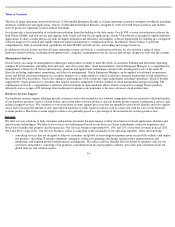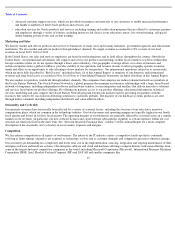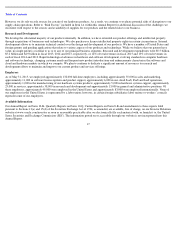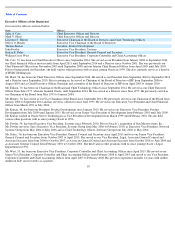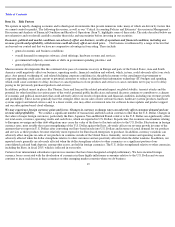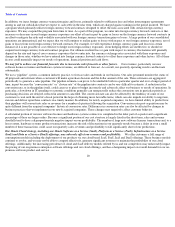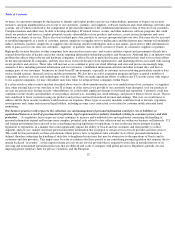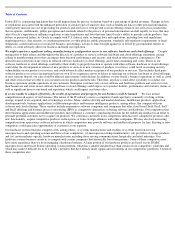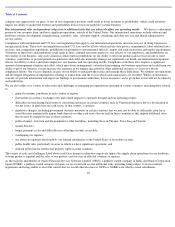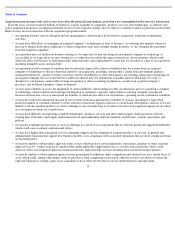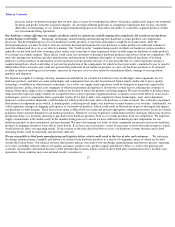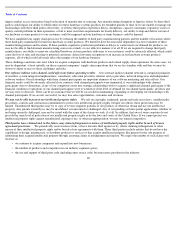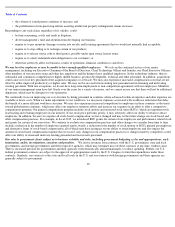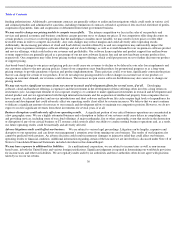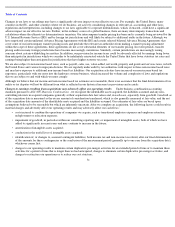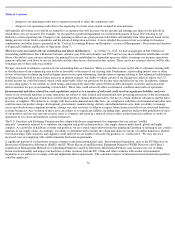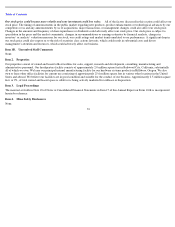Oracle 2014 Annual Report Download - page 28
Download and view the complete annual report
Please find page 28 of the 2014 Oracle annual report below. You can navigate through the pages in the report by either clicking on the pages listed below, or by using the keyword search tool below to find specific information within the annual report.
Table of Contents
compete very aggressively on price. A loss in our competitive position could result in lower revenues or profitability, which could adversely
impact our ability to realize the revenue and profitability forecasts for our hardware systems business.
Our international sales and operations subject us to additional risks that can adversely affect our operating results. We derive a substantial
portion of our revenues from, and have significant operations, outside of the United States. Our international operations include software and
hardware systems development, manufacturing, assembly, sales, customer support, consulting and other services and shared administrative
service centers.
Compliance with international and U.S. laws and regulations that apply to our international operations increases our cost of doing business in
foreign jurisdictions. These laws and regulations include U.S. laws and local laws which include data privacy requirements, labor relations laws,
tax laws, anti-
competition regulations, prohibitions on payments to governmental officials, import and trade restrictions and export requirements.
Violations of these laws and regulations could result in fines, criminal sanctions against us, our officers or our employees, and prohibitions on
the conduct of our business. Any such violations could result in prohibitions on our ability to offer our products and services in one or more
countries, could delay or prevent potential acquisitions and could also materially damage our reputation, our brand, our international expansion
efforts, our ability to attract and retain employees, our business and our operating results. Compliance with these laws requires a significant
amount of management attention and effort, which may divert management’
s attention from running our business operations and could harm our
ability to grow our business, or may increase our expenses as we engage specialized or other additional resources to assist us with our
compliance efforts. Our success depends, in part, on our ability to anticipate these risks and manage these difficulties. We monitor our operations
and investigate allegations of improprieties relating to transactions and the way in which such transactions are recorded. Where circumstances
warrant, we provide information and report our findings to government authorities, but no assurance can be given that action will not be taken by
such authorities.
We are also subject to a variety of other risks and challenges in managing an organization operating in various countries, including those related
to:
The variety of risks and challenges listed above could also disrupt or otherwise negatively impact the supply chain operations for our hardware
systems products segment and the sales of our products and services in affected countries or regions.
As the majority shareholder of Oracle Financial Services Software Limited (OFSS), a publicly traded company in India, and Oracle Corporation
Japan (NOKK), a publicly traded company in Japan, we are faced with several additional risks, including being subject to local securities
regulations and being unable to exert full control that we would otherwise have if OFSS or NOKK were wholly owned subsidiaries.
24
•
general economic conditions in each country or region;
•
fluctuations in currency exchange rates and related impacts to customer demand and our operating results;
•
difficulties in transferring funds from or converting currencies in certain countries such as Venezuela that have led to a devaluation of
our net assets, in particular our cash assets, in that country
’
s currency;
•
regulatory changes, including government austerity measures in certain countries that we may not be able to sufficiently plan for or
avoid that may unexpectedly impair bank deposits or other cash assets that we hold in these countries or that impose additional taxes
that we may be required to pay in these countries;
•
political unrest, terrorism and the potential for other hostilities, including those in Ukraine, Syria, Iraq and Yemen;
•
natural disasters;
•
longer payment cycles and difficulties in collecting accounts receivable;
•
overlapping tax regimes;
•
our ability to repatriate funds held by our foreign subsidiaries to the United States at favorable tax rates;
•
public health risks, particularly in areas in which we have significant operations; and
•
reduced protection for intellectual property rights in some countries.


